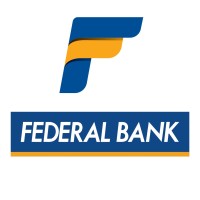
Central Bank of the Commonwealth
None



None

Federal Bank, one of the leading private sector banks with presence across the country, began its journey from humble backgrounds to reach the stature of an institution with national prominence & character. With a rich legacy of 7 decades, the Bank aspires to be the most admired Bank in the country and fueling its dreams are the 19 million and growing customer base who have always been loyal to the Bank as the Bank is to them. Headquartered in Aluva, Kerala, the Bank’s scrips are widely held and are listed in the Bombay Stock Exchange and National Stock Exchange in India. The Bank’s global depository receipts are listed on the London Stock Exchange. The Bank has built its empire on the twin values of ethics and excellence, and this has propelled the Bank throughout its journey. Over 1,588 branches, 2079+ ATMs/ Cash Recyclers and a committed, experienced & energetic workforce, Federal Bank now has its presence across the nation. To service the NRIs, who have been its pillars of strength, the Bank operates Representative Offices at Dubai and Abu Dhabi in the UAE. The Bank today handles one fifth of the total NR remittance to the country and this is testimony to its relationship with the NR diaspora. The Bank also has an IFSC Banking Unit (IBU) in Gujarat International Finance Tec-City (GIFT City). Transformation is inevitable and for Federal Bank it has been no different. The Bank believes in transforming itself, keeping its principles intact, to match the beats of the industry and the expectations of its stakeholders. Technology is the new buzzword, and it has left its indelible mark in the banking industry as well. Disclaimer: Federal Bank advices against sharing any confidential information on social media handles of the Bank
Security & Compliance Standards Overview












No incidents recorded for Central Bank of the Commonwealth in 2025.
No incidents recorded for Federal Bank in 2025.
Central Bank of the Commonwealth cyber incidents detection timeline including parent company and subsidiaries
Federal Bank cyber incidents detection timeline including parent company and subsidiaries
Last 3 Security & Risk Events by Company
Angular is a development platform for building mobile and desktop web applications using TypeScript/JavaScript and other languages. Prior to versions 19.2.16, 20.3.14, and 21.0.1, there is a XSRF token leakage via protocol-relative URLs in angular HTTP clients. The vulnerability is a Credential Leak by App Logic that leads to the unauthorized disclosure of the Cross-Site Request Forgery (XSRF) token to an attacker-controlled domain. Angular's HttpClient has a built-in XSRF protection mechanism that works by checking if a request URL starts with a protocol (http:// or https://) to determine if it is cross-origin. If the URL starts with protocol-relative URL (//), it is incorrectly treated as a same-origin request, and the XSRF token is automatically added to the X-XSRF-TOKEN header. This issue has been patched in versions 19.2.16, 20.3.14, and 21.0.1. A workaround for this issue involves avoiding using protocol-relative URLs (URLs starting with //) in HttpClient requests. All backend communication URLs should be hardcoded as relative paths (starting with a single /) or fully qualified, trusted absolute URLs.
Forge (also called `node-forge`) is a native implementation of Transport Layer Security in JavaScript. An Uncontrolled Recursion vulnerability in node-forge versions 1.3.1 and below enables remote, unauthenticated attackers to craft deep ASN.1 structures that trigger unbounded recursive parsing. This leads to a Denial-of-Service (DoS) via stack exhaustion when parsing untrusted DER inputs. This issue has been patched in version 1.3.2.
Forge (also called `node-forge`) is a native implementation of Transport Layer Security in JavaScript. An Integer Overflow vulnerability in node-forge versions 1.3.1 and below enables remote, unauthenticated attackers to craft ASN.1 structures containing OIDs with oversized arcs. These arcs may be decoded as smaller, trusted OIDs due to 32-bit bitwise truncation, enabling the bypass of downstream OID-based security decisions. This issue has been patched in version 1.3.2.
Suricata is a network IDS, IPS and NSM engine developed by the OISF (Open Information Security Foundation) and the Suricata community. Prior to versions 7.0.13 and 8.0.2, working with large buffers in Lua scripts can lead to a stack overflow. Users of Lua rules and output scripts may be affected when working with large buffers. This includes a rule passing a large buffer to a Lua script. This issue has been patched in versions 7.0.13 and 8.0.2. A workaround for this issue involves disabling Lua rules and output scripts, or making sure limits, such as stream.depth.reassembly and HTTP response body limits (response-body-limit), are set to less than half the stack size.
Suricata is a network IDS, IPS and NSM engine developed by the OISF (Open Information Security Foundation) and the Suricata community. In versions from 8.0.0 to before 8.0.2, a NULL dereference can occur when the entropy keyword is used in conjunction with base64_data. This issue has been patched in version 8.0.2. A workaround involves disabling rules that use entropy in conjunction with base64_data.